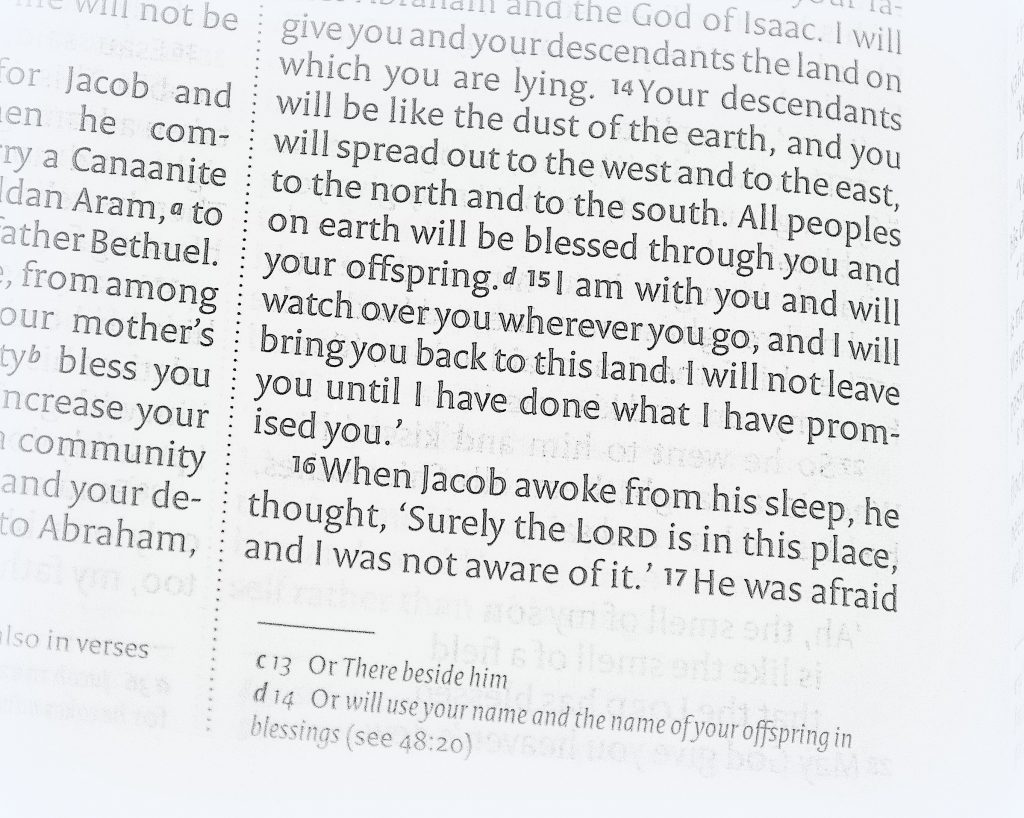Lesson 5: Read carefully

(Genesis 28:15c)
This course started between Eastern and Pentecost. Your faith in the risen Lord makes you yearn to be filled by the Holy Spirit, especially during those days. And how important praying is in this! You partake in the lessons from this book because you long for growth in prayer. Hopefully that is what you receive from God over time: growth and deepening of your prayer life.
In this fifth lesson, we will continue to explore lectio divina. We focus on the first step: reading (lectio).
Addition: An example of a lectio divina exercise
5.1 The first step: reading
So read. That is the first step of lectio divina. Read to really let the words sink in. Because we so often read quickly and cursorily, it is important to slow down, and savour the words very carefully. Monks refer to this with a Latin word ‘ruminare’ which means; to ruminate. To really taste the words chew the words over and over again to taste them well.
And repeat. Don’t assume you already know what it says after reading once or twice. Take the time to hear the words afresh. Let it surprise you. It may be useful to write out the text a few times, or to memorize the text first before moving to the next step of thinking. You can read the words aloud a few times.
Anyway: really take your time to read. Read calm, carefully, with diligence. The words of God are always worth it!
5.2 Attentiveness
This reading is also an exercise in attentiveness. Our thoughts are oftentimes so scattered. How difficult it is, to stay focused on the task before us that right now requires our attention. We have a tendency to want to read something else, again, and put this text aside.
The step of reading certainly is an exercise maintaining focus.
Being mindful is a value of monastic life where lectio divina originates. Whatever you are doing, give it your full attention. Don’t leave, stay.
In Latin monastic terms this is also called ‘stabilitas loci’ (steadfastness of place). That expression is first and foremost about a monk’s promise to stay in this one monastery all his life, in this single place. When you apply this to Scripture reading it means: stay with this one text for the time you have scheduled. Don’t look at other texts that might be more interesting. Read and read and read. Slowly, lovingly, listening.
5.3 That single word, that one sentence
Reading, you will often notice that there is one word, one sentence, that speaks to you particularly. Your attention is drawn to it again and again. You may see this as an invitation from the Holy Spirit to reflect on that one word, that one sentence in particular, in the remainder of your lectio divina time.
A participant wrote: ‘Slowly, lovingly and listening’ – I think that is well said. I tend to analyze, to overthink, causing me to process thoughts and phrases “head first”, and not with intuition, feeling, presence’. And that is important indeed, even in the first phase of reading. Not instantly analyzing things (though it really isn’t forbidden), but to spend time with the text ‘with intuition, feeling and presence’ above all.
How much time you should devote to this? That will be different for everybody. In any case, have the courage to postpone saying: ‘Now I know exactly what it says’ for a long time. For it always says more, there is always more to discover, to savour, to appreciate, always more to feel than you think. For we are engaged in words of God, which are full with his Spirit.
Reflecting
1. Try to think of which Bible verse (or verses) have become important to you over time. How did they enter your life, in what situation?
2. What differences do you see between dealing with a biblical text in an analytical manner compared to a more intuitive approach? What is the value of both ways?
Practicing
In this lesson we will do another lectio divina exercise with psalms 143; this time verse 10.
Teach me to do your will,
for you are my God!
Let your good Spirit lead me
on level ground!
Preparatory to this lectio divina exercise you can listen to ‘Cause me to hear’, a song David Jackson wrote upon Psalm 143. Listen carefully to this song again. Try to focus and stay completely with the lyrics of the song. That too is a form of ‘lectio’, but with music.
Try to give the four steps of lectio divina their own place and character as good as you can. If you notice you get things mixed up: no problem! That’s how it goes. What you are able to distinguish in a meaningful way in theory, may not be perfectly apportioned in reality. Now listen to this song ‘Cause me to hear’.
Inspiring quote
From Richard J. Foster’s book ‘Prayer, Finding the heart’s true home’ (1992), ), I‘d like to share the following quote to contemplate:
Praying is change. That is a major mercy. It is wonderful that God is making a way for us to shape love, joy, peace, patience, kindness, goodness, faithfulness, meekness, and self-control.
